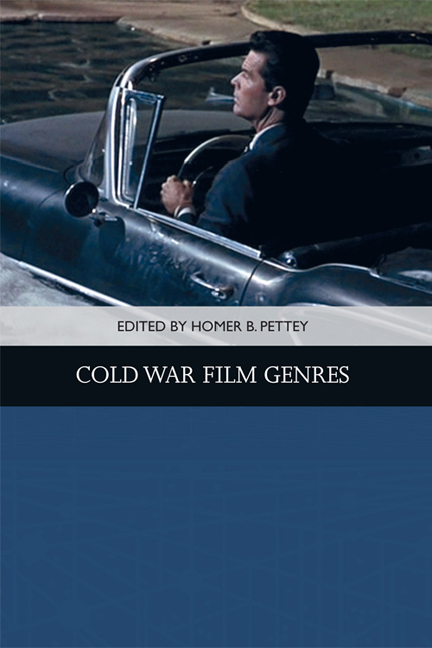Book contents
- Frontmatter
- Contents
- List of Illustrations
- Acknowledgments
- Notes on the Contributors
- 1 Introduction: Cold War Genres and the Rock-and-Roll Film
- 2 Social Factors in Brainwashing Films of the 1950s and 1960s
- 3 The Berlin Crisis? Piffl!: Billy Wilder’s Cold War Comedy, One, Two, Three
- 4 The Small Adult Film: A Prestige Form of Cold War Cinema
- 5 “I’m Lucky – I Had Rich Parents”: Disability and Class in the Postwar Biopic Genre
- 6 Rogue Nation, 1954: History, Class Consciousness, and the “Rogue Cop” Film
- 7 Internal Enmity: Hollywood’s Fragile Home Stories in the 1950s and 1960s
- 8 Suburban Sublime
- 9 Domestic Containment for Whom? Gendered and Racial Variations on Cold War Modernity in the Apartment Plot
- 10 Success and the Single Girl: Urban Romances of Working Women
- 11 Paris Loves Lovers and Americans Loved Paris: Gender, Class, and Modernity in the Postwar Hollywood Musical
- 12 Straight to Baby: Scoring Female Jazz Agency and New Masculinity in Henry Mancini’s Peter Gunn
- Index
6 - Rogue Nation, 1954: History, Class Consciousness, and the “Rogue Cop” Film
Published online by Cambridge University Press: 24 April 2021
- Frontmatter
- Contents
- List of Illustrations
- Acknowledgments
- Notes on the Contributors
- 1 Introduction: Cold War Genres and the Rock-and-Roll Film
- 2 Social Factors in Brainwashing Films of the 1950s and 1960s
- 3 The Berlin Crisis? Piffl!: Billy Wilder’s Cold War Comedy, One, Two, Three
- 4 The Small Adult Film: A Prestige Form of Cold War Cinema
- 5 “I’m Lucky – I Had Rich Parents”: Disability and Class in the Postwar Biopic Genre
- 6 Rogue Nation, 1954: History, Class Consciousness, and the “Rogue Cop” Film
- 7 Internal Enmity: Hollywood’s Fragile Home Stories in the 1950s and 1960s
- 8 Suburban Sublime
- 9 Domestic Containment for Whom? Gendered and Racial Variations on Cold War Modernity in the Apartment Plot
- 10 Success and the Single Girl: Urban Romances of Working Women
- 11 Paris Loves Lovers and Americans Loved Paris: Gender, Class, and Modernity in the Postwar Hollywood Musical
- 12 Straight to Baby: Scoring Female Jazz Agency and New Masculinity in Henry Mancini’s Peter Gunn
- Index
Summary
Surely this is not the best of possible worlds since we can easily conceive of possible worlds that are better.
Gottfried Wilhelm Leibniz, TheodicyIn 1954 the hydrogen bomb or H-bomb – 2,250 times as powerful as the atom bomb that was dropped on Hiroshima – was exploded at Bikini atoll in the Pacific; Wisconsin Senator Joseph McCarthy was condemned by the United States Senate, at the time only the fourth person in its history to be so censured; and the U.S. Supreme Court ruled that “separate facilities [for Negroes] are inherently unequal,” outlawing segregation in public schools.
If the “outstanding feature of the crime film” in 1950s America “was its focalization of the audience through the perspective of the cop,” Fritz Lang's The Big Heat (1953) can be said to dramatize the period's racial and atomic structures of feeling even as it indexes one of the dominant subgenres of the ‘50s crime film: the syndicate film. The syndicate film, in turn, can be said to represent the “criminal-cop moment of the McCarthyite crime film” in which the nationwide “combine” exposed by the Kefauver Committee is the domestic other of the “red menace,” itself understood as the Big Other. From this dual perspective, the “rogue cop” film can be said to promote the individual against the totalizing forces of Cold War society which is epitomized, in the political and criminal spheres, by pervasive corruption. The prototype here is The Racket, John Cromwell's 1951 remake of Lewis Milestone's 1928 picture where Captain McQuigg (Robert Mitchum) is the “rogue cop” double of “rogue gangster” Nick Scanlon (Robert Ryan) and where McQuigg, like Scanlon, is an anachronism in a “post-war corporate world” in which “oldstyle civic duty” is opposed to the slave-wage, alienated labor of the cop on the street.
A slightly different dynamic, one infused by personal vengeance, obtains in The Big Heat. In his reading of Lang's film, Tom Gunning observes that “in some of the strongest films of the 50s” the rogue cop “affirms an ideal justice untrammeled by official corruption or incompetence, but he also risks becoming indistinguishable from the gangster he fights.” The narrative must therefore “resolve the cop's quest not only by defeating the gangster but with a renunciation of violence.”
- Type
- Chapter
- Information
- Cold War Film Genres , pp. 99 - 122Publisher: Edinburgh University PressPrint publication year: 2018



